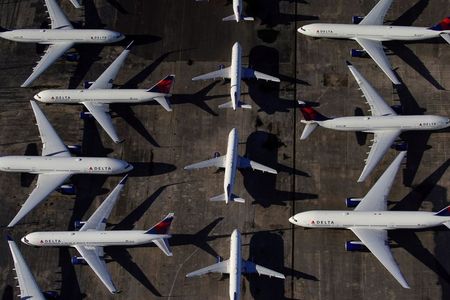By David Shepardson
WASHINGTON (Reuters) -The U.S. Transportation Department on Friday released proposed new rules to require passenger airlines to refund fees for bags that are significantly delayed and refunds for services like onboard Wi-Fi that do not work.
The proposal, which will open for public comment for 60 days, came shortly after President Joe Biden signed an executive order to boost competition throughout the economy.
That order also directs U.S. regulators to review airport slots and aviation market structure issues.
White House economic adviser Bharat Ramamurti said “it is our goal to have more competition in the airline industry.”
Rules on the allocation of airport slots have big ramifications for airline competition and market access for low-cost carriers.
Under existing U.S. rules, passengers are entitled to a fee refund if bags are lost, but not when delayed.
Under the proposed rule, a “significantly delayed checked bag” is one not delivered to the passenger within 12 hours for domestic itineraries and within 25 hours for international itineraries.
The department estimates consumers could see $10.7 million to $11.4 million annually in refunded baggage fees and estimates carriers costs at around $4 million.
That is just a tiny fraction of baggage revenue.
U.S. airlines collected approximately $5.8 billion in baggage fees and $2.8 billion in change and cancelation fees in 2019, up from just $464 million in baggage fees and $915 million in change and cancellation fees in 2007.
Airlines for America, a group representing major airlines including American Airlines Delta Air Lines and United Airlines, wrote White House economic adviser Brian Deese on Thursday to discuss the proposals.
The group said Friday that “robust competition in the U.S. airline industry has generated unprecedented levels of affordability and accessibility, benefiting the customer at every level.”
The order says the department should evaluate “existing commercial aviation programs, consumer protections” and to consult with the Justice Department “to ensure competition in air transportation and the ability of new entrants to gain access.”
It also directs considering “measures to support airport development and increased capacity and improve airport congestion management, gate access… and ‘slot’ administration.”
The administration proposal would require airlines to promptly refund fees – such as for advance seat selection, Wi-Fi and other flight services – if passengers do not receive the service or it does not work.
The Transportation Department also intends to issue a separate proposed rule to require upfront disclosure of baggage fees, change fees and cancellation fees.
The department must also submit a report within 45 days “to address the failure of airlines to provide timely refunds for flights cancelled as a result of the COVID-19 pandemic.” In June, the department said was seeking a $25.5 million fine from Air Canada over what it said was the carrier’s failure to provide timely refunds to thousands of U.S. consumers.
(Reporting by David Shepardson, Editing by Franklin Paul and Alistair Bell)





